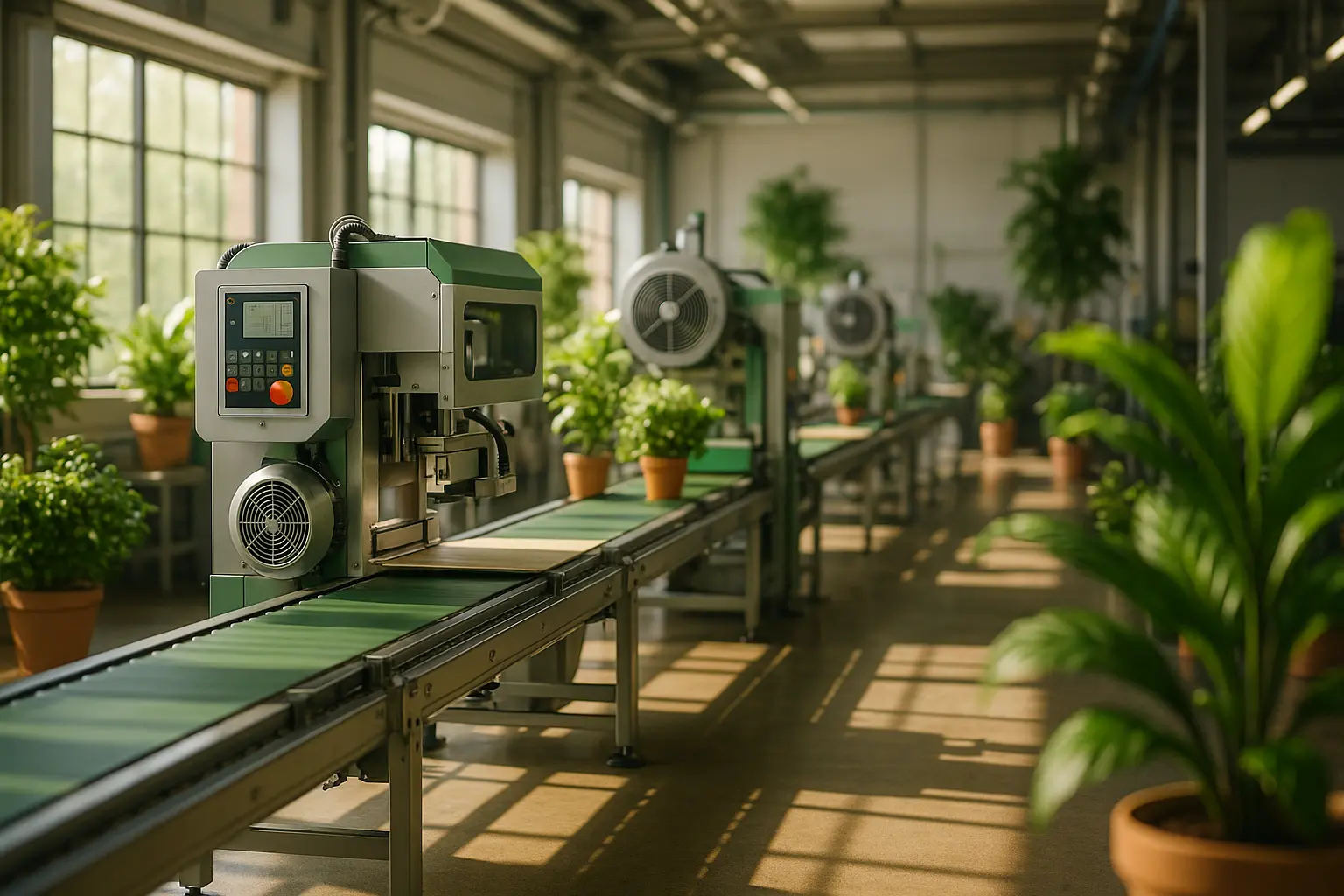In an era where environmental consciousness is no longer optional but essential, factories and manufacturing companies are at the forefront of a monumental shift. This journey towards sustainability isn’t just about reducing carbon emissions; it’s about redefining what it means to be a responsible participant in the global economy. Welcome to the green factory, where sustainable processes transform the industry and create a positive impact on our planet. Join us as we uncover the innovative strategies that drive eco-friendly production and inspire change across the sector.
Harnessing Renewable Energy Sources
As industry leaders, you stand on the brink of an energy revolution. Embracing renewable energy sources is no longer a futuristic aspiration but a present-day necessity. The traditional reliance on fossil fuels is giving way to cleaner, more sustainable alternatives, allowing factories to power operations while significantly reducing their carbon footprint.
The transformation begins with the integration of solar panels, wind turbines, and hydropower systems, which offer a dual benefit: optimizing energy efficiency and slashing operational costs. With advancements in technology, these renewable systems have become more accessible and economically viable for factories, regardless of size.
Transitioning to renewables not only diminishes environmental impact but also sets you apart as pioneers of sustainability. In today’s competitive market, consumers and stakeholders increasingly favor companies that prioritize eco-conscious practices. By investing in green energy, you bolster your brand’s reputation and position your company as a trailblazer in the manufacturing industry.
Moreover, harnessing renewable energy fosters innovation within your processes. It encourages an internal culture of responsibility and leadership, where every decision is aligned with a commitment to preserving the planet. As you adapt to these renewable systems, you pave the way for other factories to follow suit, creating a ripple effect that extends beyond your immediate production line.
Eco-friendly Materials and Resources
When it comes to sustainable manufacturing, the choice of materials is pivotal. The use of eco-friendly materials plays a crucial role in reducing the industry’s environmental impact. As manufacturers, you are tasked with sourcing sustainable resources that are ethically produced, biodegradable, and recyclable.
Consider integrating materials like bamboo, organic cotton, or recycled metals into your production processes. These alternatives not only reduce waste but also resonate with environmentally-conscious consumers who demand transparency and responsibility. Sourcing sustainable materials involves collaboration with suppliers to ensure that raw materials are harvested in ways that respect ecosystems and local communities.
Beyond materials, it’s essential to implement green processes throughout production. This involves minimizing waste by recycling and upcycling leftover materials, thereby creating a closed-loop system that maximizes resource efficiency. Digitizing operations, using software to monitor supply chains, and employing AI-driven solutions to predict demand accurately are also effective strategies to reduce unnecessary waste.
By pioneering the use of eco-friendly materials and resources, manufacturers can drive a substantial change within the industry, inspiring peers to adopt similar practices. Ultimately, this conscientious approach to production not only safeguards natural resources but secures a sustainable future for generations to come.
Reducing Waste through Innovative Processes
In the quest for sustainability, reducing waste within manufacturing processes is a critical endeavor. Waste reduction is not merely an operational tweak but a fundamental shift in how factories approach production.
The strategy begins with lean manufacturing, a philosophy that emphasizes efficiency by minimizing waste. By adopting this approach, you can streamline operations, optimize resource utilization, and ultimately enhance productivity. Through lean principles, every component of the production line is designed to eliminate excess and foster a culture of continuous improvement.
Moreover, the concept of a circular economy provides a robust framework for sustainable manufacturing. In a circular economy, waste is viewed not as a byproduct but as a potential resource. This involves rethinking end-of-life processes, ensuring that products and materials are reused, refurbished, or recycled back into the production cycle. By implementing this approach, you can significantly minimize landfill contributions and extend the lifecycle of your products.
Another innovative solution is the use of digital twin technology. This involves creating a virtual replica of your factory, allowing you to simulate production processes and identify inefficiencies before they occur in the real world. By proactively addressing potential issues, you can reduce waste, conserve resources, and improve overall operational efficiency.
Ultimately, innovative waste reduction strategies enable factories to operate more sustainably, protect the environment, and contribute to a healthier planet.
Mitigating Carbon Emissions Across the Industry
As global attention shifts towards environmental concerns, mitigating carbon emissions has become a priority for the manufacturing sector. Reducing emissions is not only a moral obligation but also a strategic move that aligns with regulatory requirements and consumer expectations.
The first step towards emission reduction is conducting a comprehensive carbon audit. This involves assessing every aspect of your operations to identify key emission sources and setting achievable reduction targets. Armed with this information, you can implement targeted strategies such as optimizing energy usage, improving transportation logistics, and upgrading to cleaner technologies.
Incorporating smart technology into manufacturing processes can dramatically reduce emissions. Automation and artificial intelligence can optimize energy consumption, manage process flows, and minimize unnecessary energy use. Additionally, investing in carbon capture and storage systems offers an innovative solution to trap emissions at the source, reducing their impact on the environment.
Collaboration within the industry is also crucial. By sharing insights and best practices, factories can work collectively to tackle emission challenges. Participation in initiatives such as carbon offset programs can further enhance your commitment by investing in projects that compensate for emissions through reforestation, renewable energy, and community development.
Reducing carbon emissions is a collective endeavor. By taking proactive steps, you not only contribute to a healthier planet but also position your company as a leader in the sustainable manufacturing movement.
The journey towards a sustainable future is a dynamic and ongoing process. As manufacturers, you have the unique opportunity to shape the landscape of the industry, leading the charge in the global effort to protect the environment. By adopting green strategies and prioritizing eco-friendly production, you secure not only the future of your business but the well-being of our planet.
As we look ahead, it’s crucial to embrace innovation and continually seek new ways to enhance sustainability. The green factory is but a starting point. The vision extends beyond current practices, propelling us into a future where sustainability is the norm rather than the exception. By staying committed to this path, you ensure that your legacy will be one of responsibility, resilience, and respect for the world around us.
Together, we can move beyond green to encompass a holistic, sustainable vision—one that prioritizes the health of our planet and the prosperity of future generations.
FAQ
What are some strategies for achieving sustainable production in a factory setting?
Implementing energy-efficient technologies, utilizing renewable energy sources, reducing waste through recycling and reusing materials, and optimizing resource consumption are key strategies for sustainable production.
How can factories minimize their environmental impact?
Factories can minimize their environmental impact by adopting eco-friendly practices such as reducing emissions, conserving water, using sustainable materials, and promoting a circular economy approach.
What role does technology play in ecological production?
Technology plays a crucial role in ecological production by enabling smart manufacturing processes, improving energy efficiency, facilitating real-time monitoring of resources, and optimizing supply chains to reduce carbon footprints.
How can waste management be improved in a production facility?
Waste management can be improved by implementing comprehensive recycling programs, utilizing waste-to-energy technologies, fostering a culture of waste reduction, and ensuring proper disposal of hazardous materials.
Why is it important for factories to focus on sustainable practices?
Focusing on sustainable practices is vital as it helps reduce environmental strain, conserves natural resources, meets regulatory requirements, enhances brand reputation, and ensures long-term operational viability.


